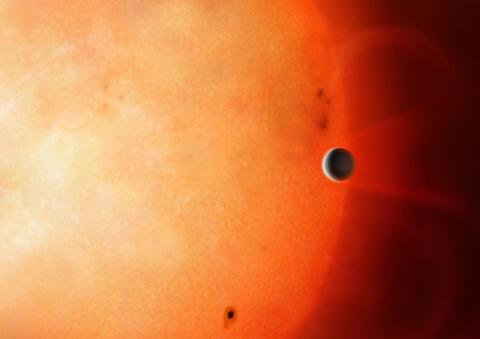But small is relative. Though NGTS-4b is 20% smaller than Neptune, that is about 3 times the size of Earth, and 20 times our Earth in mass. It has been nicknamed the 'Forbidden' planet by researchers and is hotter than Mercury at 1,000 degrees Celsius. It orbits around the star in only 1.3 days - the equivalent of Earth's orbit around the sun of one year.
The Neptunian Desert is the region close to stars where no Neptune-sized planets are found. This area receives strong irradiation from the star, meaning the planets do not retain their gaseous atmosphere as they evaporate leaving just a rocky core. However NGTS-4b still has its atmosphere of gas.
It is the first exoplanet of its kind to have been found in the Neptunian Desert.

NGTS-4b, 'The Forbidden Planet'. Image: University of Warwick/Mark Garlick
How they did it
When looking for new planets astronomers look for a dip in the light of a star - this the planet orbiting it and blocking the light. Usually only dips of 1% and more are picked up by ground-based searches, but the NGTS telescopes can pick up a dip of just 0.2%
Researchers believe the planet may have moved into the Neptunian Desert recently, in the last one million years, or it was very big and the atmosphere is still evaporating.
Dr Richard West, from the Department of Physics at the University of Warwick commented, "This planet must be tough - it is right in the zone where we expected Neptune-sized planets could not survive. It is truly remarkable that we found a transiting planet via a star dimming by less than 0.2% - this has never been done before by telescopes on the ground, and it was great to find after working on this project for a year.
"We are now scouring out data to see if we can see any more planets in the Neptune Desert - perhaps the desert is greener than was once thought."






Comments